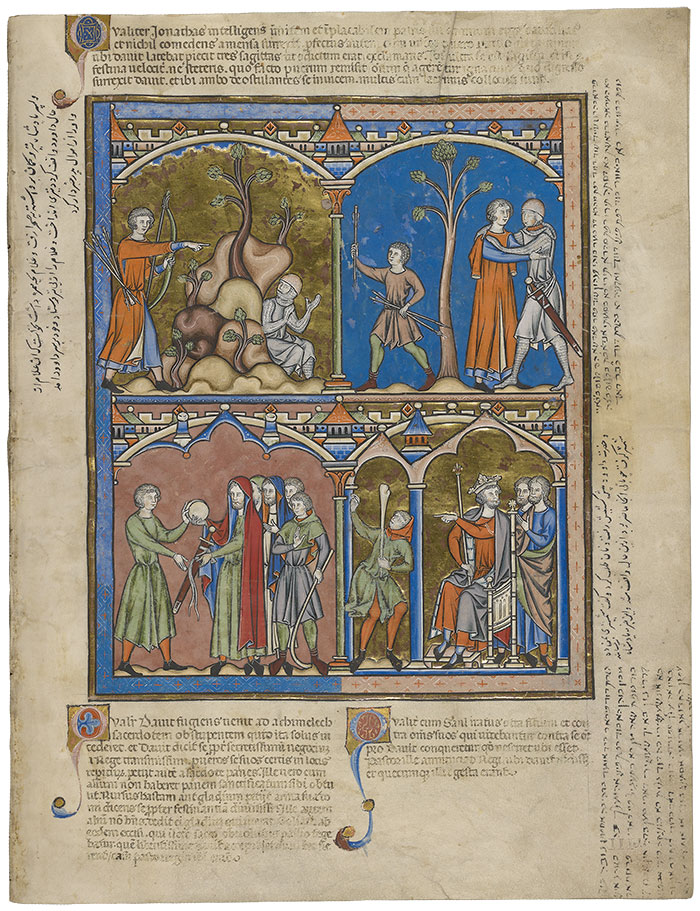
A Tearful Farewell, Ahimelech Provisions David, David Feigns Madness
Old Testament Miniatures with Latin, Persian, and Judeo-Persian inscriptions
Purchased by J.P. Morgan (1867–1943) in 1916
A Tearful Farewell
Accompanied by a page, Jonathan returns to the field where David lies hidden. He shoots three arrows as a signal to his friend and orders the page to retrieve them. After the boy is dismissed, David emerges from his rocky hiding place and embraces Jonathan. After swearing allegiance to Jonathan and his house, David takes his leave. (1 Kings 20: 35–43)
Ahimelech Provisions David
David makes his way to Nob and to the place of the priest Ahimelech. The priest is uneasy, observing that David travels alone and unarmed. David explains that he is on a secret mission for the king. Satisfied, the priest provisions David with the only food on hand—circular loaves of hallowed bread—and arms him with a familiar weapon, the mighty sword of Goliath. Doeg, Saul's chief herdsman, is witness to the event and will inform the king. (1 Kings 21:6–9)
David Feigns Madness
Seeking refuge, David travels to the court of Achish, king of Gath. Soon, the famous warrior is recognized by the servants of Achish and brought before the king. Fearing the consequences of discovery, David pretends madness. He deliberately stumbles about, swinging an enormous club. The annoyed king turns to his advisors and demands that the lunatic be dismissed. (1 Kings 21:10–14)
Folio 32r (Latin)
Upper half: How, Jonathan, aware of his father’s savage and implacable disposition toward David, was angered and arose from the table without eating. Thereupon, having gone with one little boy to the field where David was hiding, he shot three arrows, as he had said, crying, "There is the arrow further behind you," and again: "Make haste quickly, stand not!". This done, he dismissed the boy, unaware of all that had happened. When that one had departed, David arose and went there, and the two conversed, kissing each other with many a tear. (I Samuel 20: 34–42)
Lower left: How, fleeing, David came to Ahimelech, the priest, who wondered why he was coming alone. David told him that the king had sent him on a secret mission to find his servants in certain places. Then he asked bread from the priest, but he offered him holy bread, as he did not have any other. Then he asked him again for a spear or a sword, saying that he had left his arms at home since he was hurrying away. The priest, having no other, gave him the sword of Goliath, whom he himself had killed, which was concealed in a sacred place wrapped up in a mantle. Now, one of the king’s shepherds happened to be there, as these things were happening. (I Samuel 21: 1–9)
Lower right: How Saul was angry with his son and with all of his men who seemed to be against him and to support David, and, when he complained loudly that he did not know where he was, that shepherd told the king where he had seen David and what had happened there. (I Samuel 22: 6–10)
Folio 32r (Persian)
Upper left margin: The king’s son picked up a bow and arrow and went into the fields and he had a page with him. Not wanting the slave to know of David’s whereabouts, he threw an arrow and sent the slave after the arrow and he himself came upon David and informed him of his father’s state.
Lower right margin: His Excellence David went before the priest and requested bread and said, "Give me a sword." He got a sword. A shepherd was present there; he found out about this event and delivered the news to the king.
Folio 32r (Judeo-Persian)
Upper right margin: The next day, which was the day of the festival, David went in the field, hid in the midst of the hills. The king’s son also took along a young boy to bring back arrows shot into the field. He shot off an arrow and said to the boy, "Go get the arrow," while he himself went before David and informed him of the incident [with his father].
Lower right margin: His Excellence David fled and came to a village named Nob, the habitation of priests. He went before Ahimelech, who was their leader, and said, "The king dispatched me on a mission in haste. If you have a loaf of bread and a knife, give them to me." The sword with which David had killed Goliath had been entrusted to Ahimelech; he brought it out and gave it to David...Doeg, the Aramean....
Italicized words are in Hebrew.
Content consultant: Richard Leson
Persian translated by Sussan Babaie
Judeo-Persian translated by Vera Basch Moreen
Latin translation by Eran Lupu
After the commentary volume accompanying the Fine Art Facsimile edition by Faksimile Verlag Luzern
